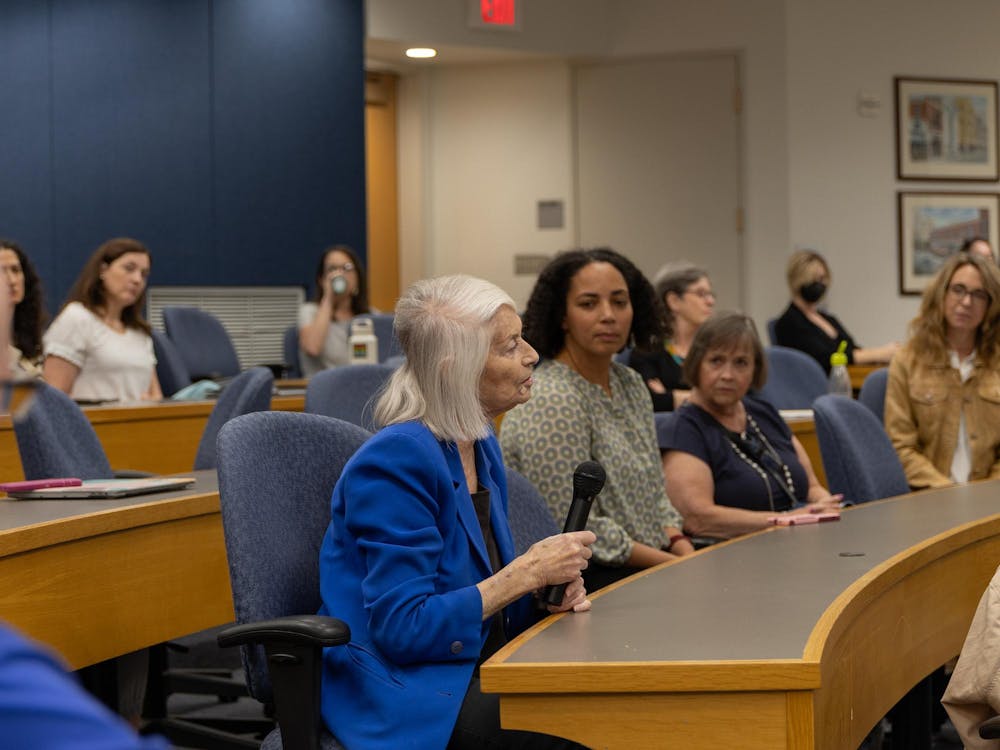In its first meeting of the academic year, Arts & Sciences Council revealed that only five proposals had been submitted for first-year Constellations one day before the submission deadline, falling short of its goal of 20 to 25 proposals.
Constellations are an integral part of the Trinity College of Arts & Sciences’ new curriculum, which was overhauled by the council last year and approved in April — the first major change since 2000.
Faculty members were briefed on the council’s progress in implementing the curriculum, which is scheduled to roll out in fall 2025. The council also welcomed its new chair and conferred teaching awards at the Thursday meeting.
Curriculum implementation
Deborah Reisinger, professor of the practice of romance studies, Mine Cetinkaya-Rundel, professor of the practice of statistical science and Curriculum Implementation Committee chair, and Greg Samanez-Larkin, Jerry G. and Patricia Crawford Hubbard professor of psychology and neuroscience and chair of the Constellations Implementation Committee, updated the council on the curriculum’s rollout and answered council members’ questions.
Faculty members are focusing primarily on the first-year curriculum this semester, which includes reviewing Constellations proposals, providing feedback and coding courses for the University registrar. Implementation of the curriculum’s other elements will continue through fall 2025.
“Soon enough, the conversation will move from pitching Constellations to developing them, and we're going to be talking about more of the pitching of Century Courses,” Cetinkaya-Rundel said.
Century Courses, which are designed to provide first-years with a foundation for their intended major and fulfill two Trinity requirements, will not be launched until fall 2026.
Starting with the Class of 2029, first-years must take one Constellation of three interdisciplinary courses connected by a common theme, including one Writing 101 class.
“These approaches and the curriculum’s increased focus on humanities, I think, are exactly what our students — and frankly, our society — needs today,” Bennett said. “… The curriculum will honor and inspire excellent instruction [and] will emphasize connections and encourage curiosity and epistemic humility.”
During the Q&A session following the presentation, faculty members clarified that multiple Writing 101 classes may correspond to the same Constellation, allowing first-years to share a class with students outside their respective Constellations.
“We’re also hard at work thinking about what sort of assessment pieces need to be in place once students actually enroll in this curriculum,” Cetinkaya-Rundel said. According to her, standing committees will be established to review Constellations and Century Courses.
Samanez-Larkin added that co-curricular activities will be established to complement a Constellation’s classes.
He noted that faculty have been able to submit Constellation proposals since June. He also said that faculty will work “to build these out … over the next couple of months” to determine a final list of Constellation options, as well as program size.
Several questions remain unanswered, including big-picture queries such as how the registration process will work for Constellations and how University administration will communicate the new format to incoming students.
“These are the types of questions we're thinking about nowadays … nothing is exactly answered, but we do need answers for them soon,” Cetinkaya-Rundel said.
Faculty expect Constellations to depend on faculty availability and be renewed on an annual basis, although this provision may change in the future.
For now, the committee encouraged faculty to submit proposals for prospective Constellations before the Friday deadline. Samanez-Larkin stressed that proposals do not have to be extensive and that faculty can submit incomplete forms, as the final format will be developed throughout the year before the new curriculum launches.
In other business
The council handed out faculty awards and heard from newly elected chair Denise Comer, professor of the practice of the Thompson Writing Program, Dean of Trinity College Gary Bennett and Arts & Sciences Program Coordinator Tony Snipes.
Get The Chronicle straight to your inbox
Sign up for our weekly newsletter. Cancel at any time.
Comer, who previously worked on the council’s Trinity Curriculum Development Committee, succeeds interim chair Paul Manos, professor in the department of biology, and will serve a three-year term.
“I was thrilled to learn that [Comer] would seriously consider running for council chair,” Bennett said. “… We were so impressed with the conceptual clarity of her vision and her respect for faculty governance.”
Four faculty members received teaching awards from the Committee on Undergraduate Teaching.
Karin Shapiro, associate professor of the practice in both the department of African and African American studies and the department of history, was awarded the Howard D. Johnson Teaching Award for a teaching strategy that “reflects a deep level of commitment and care for her students.” April Henry, director of the German Studies Language Program and lecturer of German studies, was given the Richard K. Lublin Teaching Award for a “masterclass in teaching.”
Kathryn Haas, associate professor of the practice of chemistry, won the David and Janet Vaughan Brooks Teaching Award for her transformation of laboratory courses into “course-based undergraduate research experiences known as cures.” Caroline Stinson, professor of the practice of music, was given the Robert B. Cox Award for being an “exemplary teacher” who “truly inspires excellence” and creativity in her students.
Samanyu Gangappa is a Trinity sophomore and local/national news editor for the news department.

